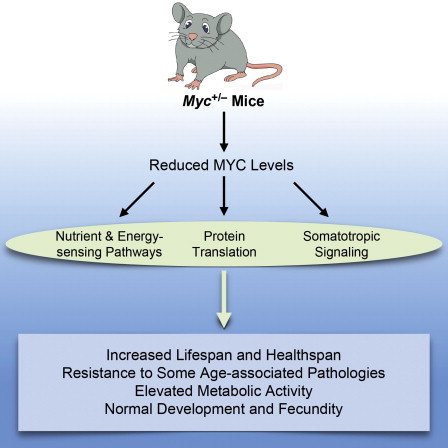Guide
MYC has been a hot research topic for scientists for many years. This transcription factor promotes cell proliferation and is overexpressed in most human cancers. However, the relationship between MYC and health is not only that simple. A study published in the January 21 issue of Cell magazine showed that mice with only one copy of the Myc gene live longer and healthier than wild mice.

MYC has been a hot research topic for scientists for many years. This transcription factor promotes cell proliferation and is overexpressed in most human cancers. However, the relationship between MYC and health is not only that simple. A study published in the January 21 issue of Cell magazine showed that mice with only one copy of the Myc gene live longer and healthier than wild mice.
To study cellular aging, the John Sedivy team at Brown University established a genetically engineered mouse that lacks a copy of Myc.
To their surprise, this operation did not promote cell senescence, but prolonged the lifespan of mice. "Our mice are very long-lived and quite normal and healthy," Sedivy said.
This phenomenon has also surprised many Myc researchers. "We have been working on the normal function of MYC and its role in cancer," commented Linda Penn, a cancer biologist at the University of Toronto. "I didn't expect it to be related to longevity."
MYC is a major regulator of cell growth and proliferation, Penn explained. It is estimated that MYC directly regulates 15% to 20% of the genome. If both copies of Myc are deleted, the mouse will die during the embryonic period.
Myc copy deletion reduced the expression of its encoded protein (MYC). The average lifespan of Myc heterozygous mice was increased by 15% compared to normal mice, with female mice extending their lifespan by 20% and male mice by 10%. In addition, genetically engineered mice are 15% smaller than normal mice, but this is not because they eat less, in fact they eat more than normal mice.
“These animals are obviously aging more slowly,†Sedivy said. “The function of their organs and tissues can last longer.â€
Physiological difference
The first author of the article, Dr. Jeffrey Hoffman, conducted a comprehensive health assessment of Myc heterozygous mice and found that these mice were quite normal. Most of the current anti-aging methods have certain drawbacks. For example, rapamycin increases the risk of cardiovascular disease in mice and reduces their immune function. However, Myc heterozygous mice did not show significant health problems and were able to reproduce normally. These mice are not plagued by osteoporosis, maintaining a healthier immune balance and metabolic rate, less cardiac fibrosis, and lower cholesterol levels. In addition, Myc heterozygous mice have better motor function and are more active.
Another first author of the article, Xiaoai Zhao, analyzed the pathways associated with longevity. Studies have shown that protein synthesis in certain tissues of Myc heterozygous mice is reduced, IGF1 signaling is altered, and nutrient and energy perception pathways are also different from controls. Although the specific mechanism of life extension in mice is not known, this mechanism appears to be independent of calorie restriction or stress defense mechanisms.
The study will provide pharmaceutical companies with more incentive to develop cancer drugs that block Myc overexpression. Sedivy pointed out that drugs that target Myc directly may have more benefits than cancer.
Shanghai Chuangsai Technology has excellent performance, interleukin cytokines, fetal bovine serum, electrophoresis equipment scientific instruments, raw material drug standards, chemical reagents, cell culture consumables, Shanghai Chuangsai, mass products special promotions, welcome to inquire!
2 Tier Aluminum Dish Rack,Two Tier Aluminum Kitchen Rack,Double Tier Dish Rack,Kitchen Dish Drying Rack With Tray
Jiangmen Xinhui Siqian Xiangyi Metalwork Factory , https://www.xydryingrack.com